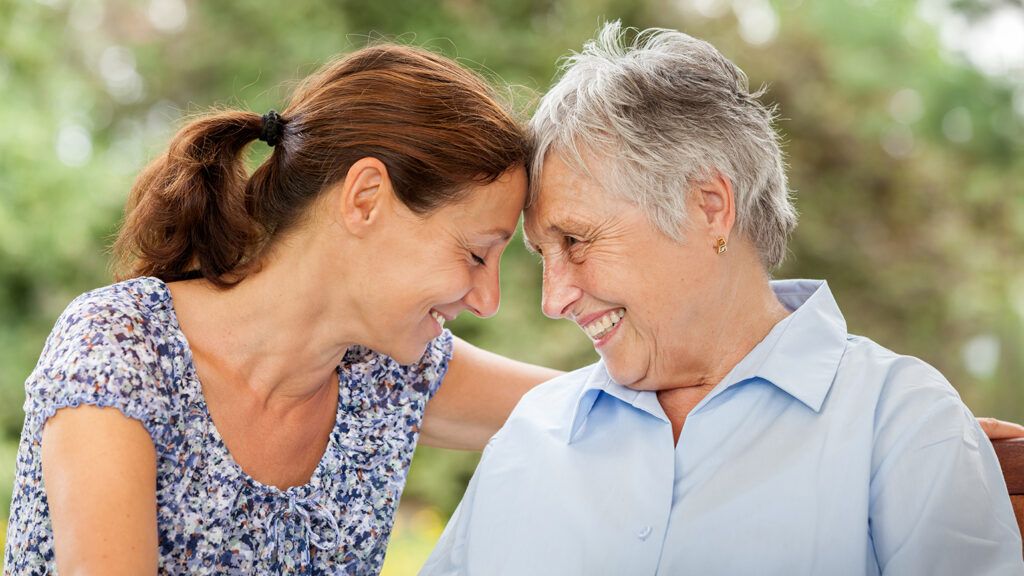There is perhaps no harder job than that of a caregiver. To give tirelessly to another, often without compensation, is the work of angels. However, as caregivers know all too well, this role can be exhausting, frustrating and disillusioning, especially when there is little appreciation returned for efforts expended.
How do caregivers continue to feed, clothe, and perform a myriad of other responsibilities without resentment seeping in? I asked a few experts to weigh in on strategies for sustaining optimism, while caring for another. Here are a few ways and tips for caregivers to stay upbeat.
1. Spot signs of burnout
“An important step toward being a conscious caregiver is recognizing your current state of being,” writes Linda Abbit in her book The Conscious Caregiver. She lists a series of questions to help you determine if you’re encroaching on burnout. Among them are these:
- Have your sleep patterns changed?
- Do you feel increasingly worried or anxious?
- Do you feel constantly irritated? Are you snapping more frequently at your care recipient?
- Have you become isolated or less social?
- Have you increased unhealthy behaviors, like drinking or smoking?
- Are you fatigued most of the day?
- Are you getting headaches, stomach aches, or frequent colds? Are you experiencing chronic pain?
2. Accept help
According to Abbit, lowering one’s stress, both immediately and long term, is the most important thing caregivers can do to prevent burnout. How to do this? Accept help! She writes, “Family caregivers often have a blind spot when it comes to their own needs and accepting help from others. It’s not a sign of weakness to need or accept help. In fact, it’s actually a sign of self-knowledge and wisdom.”
Analyze your caretaking needs ahead of time and separate them into smaller tasks that can be divided among siblings, friends, and neighbors. Write out detailed instructions for jobs like grocery shopping or running errands, so that you have a specific assignment ready for the next person who asks you, “How can I help?”
3. Attend to self-care
Dr. Robert J. Wicks specializes in working with caregivers and has written several books for caregiving professionals, including The Resilient Clinician; Overcoming Secondary Stress in Medical and Nursing Practice; and The Inner Life of the Counselor. During a presentation to helping and healing professionals, and nonprofessional caregivers, he notes, “One of the greatest gifts we can share with others is a sense of our own resilience and inner peace, but we can’t share what we don’t have.”
His point is that for caregivers self-care is not a luxury. Having an ambitious, but realistic self-care protocol is not simply a nicety, but a necessity for quality of life for both those receiving and offering care.
In his book, Bounce: Living the Resilient Life, Dr. Wicks indicates what a comprehensive self-care approach looks like in great detail but indicated to me in our interview that it must include periodic breaks from service, time with friends, a short walk outside each day, time alone for reflection, and other physically, psychologically and spiritually renewing activities.
Mindful self-care of the caregivers themselves translates into a better healing presence to those being cared for as well.
4. Construct proper boundaries
Exhaustion and resentment happen more easily when the needs of the care recipient have no borders. They bleed into all aspects of the caregiver’s life, from her relationships to her sleep and hobbies. If a caregiver doesn’t erect some serious boundaries, she runs the risk of relinquishing control and living her life according to the beckon call of her care recipient.
According to Wicks, people being cared for feel better when those who care for them feel better about themselves. Their presence to those in need is based on a healthy lifestyle, rather than simply the compulsion or duty to do good work. In other words, care recipients are happier and healthier when their caregivers establish firm boundaries and are disciplined about self-care.
5. Ask God for strength
Carol Bradley Bursack, a veteran family caregiver, supports others like her through her work as a columnist, author, blogger, and consultant. In a recent interview, she told me her faith helps her avoid burnout and remain positive.
“More than once, I was as close to burnout as I could get without declaring myself out of commission,” she explained. “Yet, when in my desperation I practiced what my faith taught me, which is to give my grief, my fatigue, and my frustration over to God and let Him handle it, I found myself able to continue on. When I was faithful enough to travel day by day with God, I even found the occasional moment to take care of myself.
“In reality, of course, I was allowing God to carry the majority of the weight and that was the best kind of self-care that I could practice. Continuing to ask God to for strength and direction helped me stay positive most of the time.”
Caregivers aren’t expected to wear a smile all the time. Anyone who has ever prepared a bath for someone knows the drudgery that’s part of the job. However, with some self-care, faith, and help from others, caregivers may remember the deeper meaning and fulfillment in cooking and cleaning for another human being. As Carl Beuner once said, “They may forget what you said but will never forget how you made them feel.”






